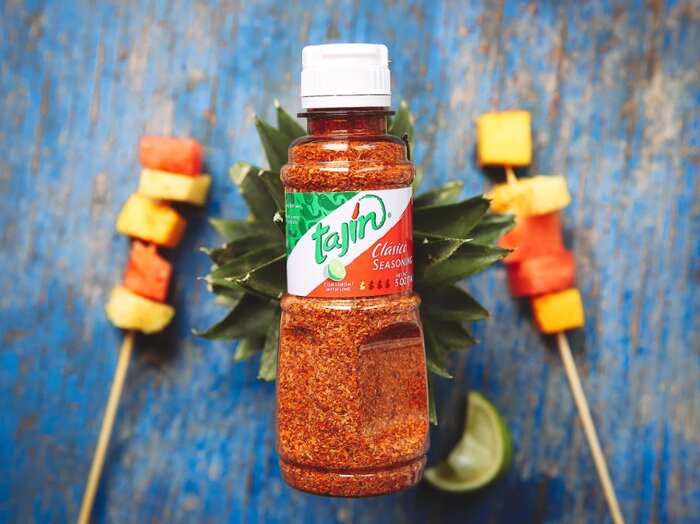Tajin is a popular seasoning that has gained a devoted following in recent years. But, like any food product, you might be wondering, “Is Tajin bad for you?“. In this article, we’ll explore the origins of Tajin, its nutritional content, potential health benefits, concerns surrounding its consumption, and how to use it wisely in your culinary adventures.
What is Tajin?
History and Origin
Tajin, pronounced “tah-heen,” is a Mexican seasoning blend that originated in the state of Jalisco. It’s a unique mixture of chili peppers, lime, and salt. The name “Tajin” is derived from the ancient city of Tajin, known for its rich culinary heritage.
Ingredients
Tajin is primarily composed of three main ingredients: chili peppers, dehydrated lime, and salt. This combination imparts a spicy, tangy, and salty flavor that’s both refreshing and zesty.
Varieties of Tajin
While the classic version of Tajin is the most well-known, there are various Tajin varieties available, including low-sodium and fruit-infused options.
Common Uses
Tajin is a versatile seasoning used to enhance the flavor of fruits, vegetables, snacks, and even beverages. It’s a go-to choice for those seeking to add a kick to their favorite dishes.
Nutritional Information
When considering whether Tajin is bad for you, it’s essential to examine its nutritional content.
Calories and Serving Size
Tajin is a low-calorie seasoning, with approximately 0 calories per 1/4 teaspoon serving. This makes it an excellent choice for flavoring without significantly impacting your calorie intake.
Sodium Content
One of the primary concerns about Tajin is its sodium content. The classic variety contains a notable amount of salt, so moderation is advised, especially for individuals with high blood pressure.
Fiber and Protein
Tajin contains minimal fiber and protein. While it’s not a significant source of these nutrients, it’s also not a primary consideration when using Tajin as a seasoning.
Health Benefits
Tajin offers some potential health benefits that may surprise you.
Flavor Without Fat
One of the remarkable attributes of Tajin is its ability to add bold flavors to dishes without the need for high-fat ingredients. This makes it an appealing choice for those watching their fat intake.
Vitamin C Content
Tajin contains vitamin C from dehydrated lime, which can contribute to your daily vitamin C intake, essential for a healthy immune system.
Digestive Benefits
The combination of chili peppers and lime in Tajin may aid digestion, as some studies suggest that spices can help with digestive processes.
Concerns About Tajin
While Tajin has its merits, there are also some concerns to be aware of.
High Sodium Levels
As mentioned earlier, Tajin’s sodium content can be relatively high, which can be problematic for individuals with sodium-sensitive conditions like hypertension.
Allergic Reactions
Some people may experience allergic reactions to the ingredients in Tajin, particularly if they have allergies to chili peppers or citrus fruits.
Moderation is Key
Tajin can be a flavorful addition to your dishes, but like any seasoning, it should be used in moderation to avoid excessive salt intake.
Tajin and Weight Management
Tajin can be a helpful ally in your weight management journey.
Low-Calorie Seasoning
With its minimal calorie count, Tajin can help you flavor your meals without adding extra calories, making it suitable for those looking to shed some pounds.
Enhancing Healthy Food Choices
Tajin can make otherwise bland and unappetizing foods more palatable, encouraging better food choices.
Recipes with Tajin
Tajin on Fruits
Sprinkle Tajin on fruits like mango, watermelon, or pineapple for a delicious and exotic twist.
Tajin in Cocktails
Add a dash of Tajin to your cocktails for a spicy and tangy kick, creating a unique and refreshing beverage.
Tajin on Vegetables
Transform steamed or grilled vegetables into a taste sensation by seasoning them with Tajin.
Tajin vs. Other Seasonings
How does Tajin stack up against other common seasonings?
Comparing to Salt
Tajin’s sodium content should be weighed against using plain salt, as it may offer a more exciting alternative.
Alternatives
If you’re concerned about the sodium levels in Tajin, there are low-sodium and salt-free alternatives available.
Tajin and Heart Health
Considering the impact of Tajin on your heart health is vital.
Sodium’s Impact on Heart Health
Excessive sodium intake can lead to high blood pressure and heart problems, so it’s essential to be mindful of your Tajin usage.
Using Tajin Sensibly
For individuals with heart health concerns, using low-sodium Tajin or reducing the amount used is advisable.
Tajin and Allergies
It’s crucial to be aware of potential allergies associated with Tajin.
Common Allergens in Tajin
Chili peppers and lime can trigger allergies in some individuals, so read the label carefully if you have allergies.
Who Should Avoid It
If you have known allergies to any of the ingredients in Tajin, it’s best to avoid it to prevent adverse reactions.
Conclusion
In conclusion, Tajin can be a flavorful addition to your meals, offering unique taste experiences and potential health benefits. However, its high sodium content makes moderation key, especially for individuals with heart health concerns. If used wisely, Tajin can be a delightful and spicy enhancement to your culinary journey.
Read Also: How to Get The Best Spices Possible
FAQs
1. Is Tajin bad for your health?
- Tajin can be enjoyed in moderation but should be used carefully if you have concerns about sodium intake. Consider low-sodium alternatives if needed.
2. Can Tajin help with weight loss?
- Tajin’s low-calorie content can make it a useful tool for enhancing the flavor of healthy, low-calorie foods.
3. Are there different varieties of Tajin?
- Yes, there are various Tajin varieties, including low-sodium and fruit-infused options.
4. What are the primary ingredients in Tajin?
- The main ingredients in Tajin are chili peppers, dehydrated lime, and salt.
5. Can Tajin be used on drinks?
- Yes, Tajin can be added to cocktails for a spicy and tangy kick, enhancing the flavor of your beverages.


